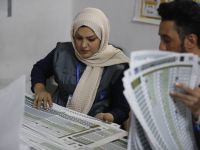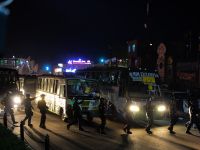The judiciary's monitoring of the Egyptian elections has opened the door wider to Islamists and other opposition members, even if it has hardly dented the ruling party's dominance, analysts said Thursday.
In the first phase of elections for a third of the seats in the 454-seat parliament, 15 opposition members were elected, in contrast to a total of only 13 opposition members in the last assembly.
Unlike in voting for the assembly elected in 1995, members of the judiciary have been required to monitor proceedings at every polling station following a ruling this year by the constitutional court.
The government of President Hosni Mubarak, which had promised "transparent" elections this year following allegations of massive fraud in 1995, did nothing to block the change.
"The presence of magistrates monitoring the voting has two positive effects," Ghislaine Alleaume, a researcher at a French institute in Cairo, told AFP.
"It has encouraged voters to go to the polling stations, and ensured greater regularity in voting," said Alleaume, director of the Center for Economic, Judicial and Social Documentation.
"Complaints of fraud and irregularities have already been filed, but with the presence of magistrates, the ballot boxes can no longer be stuffed," Alleaume said.
"The magistrates watch the voting and seal the ballot boxes," she added.
Indeed, several incidents have been reported since the elections were launched on October 18.
On Tuesday, one man was killed and 23 others hurt when police fired on pro-Islamist voters who rioted after alleging the police prevented them from going to polling stations in the Nile Delta town of Ashmun.
A candidate from the banned but partly tolerated Muslim Brotherhood lost in Ashmun to the rival from Mubarak's National Democracy Party (NDP).
But a Brotherhood candidate defeated an NDP stalwart in Alexandria and grabbed two other seats in that city as well as three others elsewhere in Egypt during the first phase.
Rounding out the seven Islamists is lawyer Adel Aid, also elected Tuesday in the Mediterranean city of Alexandria, who has no links to the Brotherhood.
The eight non-Islamist opposition winners are four dissidents from the Arab-socialist Nasserite party (who ran as independents), three members of the Marxist Tagamu party and one member of the liberal Wafd party.
Two seats remained to be decided in a district of Alexandria after the poll was cancelled on Monday following a court decision.
Some 15 independent winners have not declared any party affiliation.
However, half of the 118 deputies were first elected as independents, describing themselves as NDP dissidents before returning to the party fold after the votes were counted.
Although the opposition gains do not threaten the hold of the NDP, they are proof that "in one way or another, things are moving," a Western diplomat said.
The government seems to have accepted the ruling by the constitutional court to turn "things to its own advantage and clean up things," the diplomat said on condition he not be named.
"However, there is the risk, as usual in taking such a step, that things will go further than the government wants," the diplomat said.
The second phase of elections will take place on October 29 and November 4, while the third and final takes place on November 8 and 14 -- CAIRO (AFP)
© 2000 Al Bawaba (www.albawaba.com)







